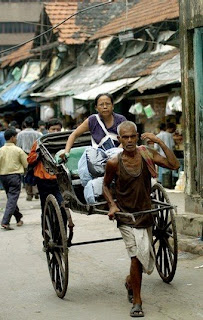 Next day, while going to an office, I saw rickshaw pullers on almost every road. I felt a little uneasy on seeing a human being pulling another human being. In the evening, I had to go somewhere, so I asked my host for directions, and he advised, "Take a rickshaw, and he would take you where you want to go." I told him that I could not imagine sitting in a rickshaw while another person, perhaps weaker than me, pulling me. My host did not buy my argument, but at last gave me direction, and I walked to my destination. I stayed in Kolkata for two weeks and later visited it again a few more times, but could never had a courage to ride a rickshaw.
Next day, while going to an office, I saw rickshaw pullers on almost every road. I felt a little uneasy on seeing a human being pulling another human being. In the evening, I had to go somewhere, so I asked my host for directions, and he advised, "Take a rickshaw, and he would take you where you want to go." I told him that I could not imagine sitting in a rickshaw while another person, perhaps weaker than me, pulling me. My host did not buy my argument, but at last gave me direction, and I walked to my destination. I stayed in Kolkata for two weeks and later visited it again a few more times, but could never had a courage to ride a rickshaw.
Many people feel that it is inhumane for a human being pulling another human being. Why? May be because we have seen animals pulling carts and when we see a human pulling a cart, we feel that we have degraded that person to an animal. I also used to think like that, however, now my thinking has changed a little bit. To survive, we all sell whatever we have -- physical power, brain power or intellectual power. A worker working in the blast furnace department of a steel mill works in very hot environment, even hotter than the hot summer period a rickshaw puller encounters on the road. However, the steel plant worker is suitably compensated and is a respected member of the society. On the other hand, a rickshaw puller and others doing similar low end jobs do not get any respect from the society or suitable compensation. Have a look at the following picture where a well-built person is being pulled through the flooded streets of Kolkata. Do you think that the rickshaw puller, who is selling his manual labour is being paid a reasonable fare?
 In general, most people feel that rickshaw pulling presents a bad image of the Kolkata and this should be stopped. In fact, in 2006, the West Bengal passed a law to ban rickshaws on Kolkata streets. However, even after more than two years since that ban, nearly 5,000 licensed and 18,000 unlicensed rickshaw pullers continue to ply rickshaws on the Kolkata streets. In fact, many people oppose the ban on the ground that rickshaws provide environment-friendly mode of transport in very densely populated Kolkata city. Of course, the livelihood of 23,000 families too depend on rickshaws, whom the West Bengal Government has not been able to provide any alternate employment. Let us see what happens in the future.
In general, most people feel that rickshaw pulling presents a bad image of the Kolkata and this should be stopped. In fact, in 2006, the West Bengal passed a law to ban rickshaws on Kolkata streets. However, even after more than two years since that ban, nearly 5,000 licensed and 18,000 unlicensed rickshaw pullers continue to ply rickshaws on the Kolkata streets. In fact, many people oppose the ban on the ground that rickshaws provide environment-friendly mode of transport in very densely populated Kolkata city. Of course, the livelihood of 23,000 families too depend on rickshaws, whom the West Bengal Government has not been able to provide any alternate employment. Let us see what happens in the future.
No comments:
Post a Comment